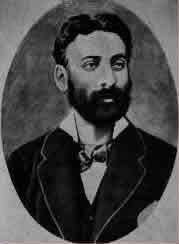Güllü Agop
| Güllü Agop | |
|---|---|
 Güllü Agop, alias Agop Vartovyan, and Yakub | |
| Born |
1840 Constantinople, |
| Died |
1902 (aged 61–62) Constantinople |
| Nationality | Ottoman Armenian |
| Occupation | theatre director |
Agop Vartovyan (Armenian: Հակոբ Վարդովյան), better known as Güllü Agop (Armenian: Գյուլլու Հակոբ), (took later the name Yakub), (1840 in Constantinople – 1902 in Constantinople) was an Ottoman Armenian theatre director as well as an occasional actor. He is widely credited with having laid the bases for Turkey's modern and nationally renowned performing arts institution that became İstanbul City Theatres (İstanbul Şehir Tiyatroları). In his qualities of organizer, sponsor and figure of support for writers and spectators, Güllü Agop is one of the 19th century pioneers of the Turkish theatre art as a whole. He was accepted founder of modern Turkish Theatre.
Biography
Vartovyan was born in 1840 in Istanbul with the name Agop Vartovyan to Armenian parents. "Güllü Agop" (literally Jacob the Rosy) was the name under which he had come to be known in the world of theatre. He converted to Islam in his forties and took the name "Yakub".[1] He is the father of Necip Yakup Aşkın, considered as one of the most prominent violin masters Turkey produced and his grandson, Yücel Aşkın, was the rector of Van's Yüzüncü Yıl University. He works an academician in the university and is chairman of Environmental Engineering.[2]
Güllü Agop had another son called İhsan Aşkın. After retiring from the army where he served as colonel, he became an actor and took part in around 50 movies.
References
- Metin And. "Osmanlı tiyatrosu, kuruluşu, gelişimi, katkısı (Ottoman theater, its foundation, development and contributions)". Bulletin of the School of Oriental and African Studies (Book review by Margaret bainbridge:). Cambridge University Press. 41: 382–383. JSTOR 615961.
- ↑ Palmira Johnson Brummett, Image and Imperialism in the Ottoman Revolutionary Press, 1908-1911, SUNY Press, 2000, ISBN 978-0-7914-4463-4, p. 404.
- ↑ Interview with Yücel Aşkın: "Dedem Ermeni'ydi, ben Türk'üm (My grandfather was Armenian, I am Turkish)" Check
|url=value (help) (in Turkish). Hürriyet. Retrieved 2007-05-28.